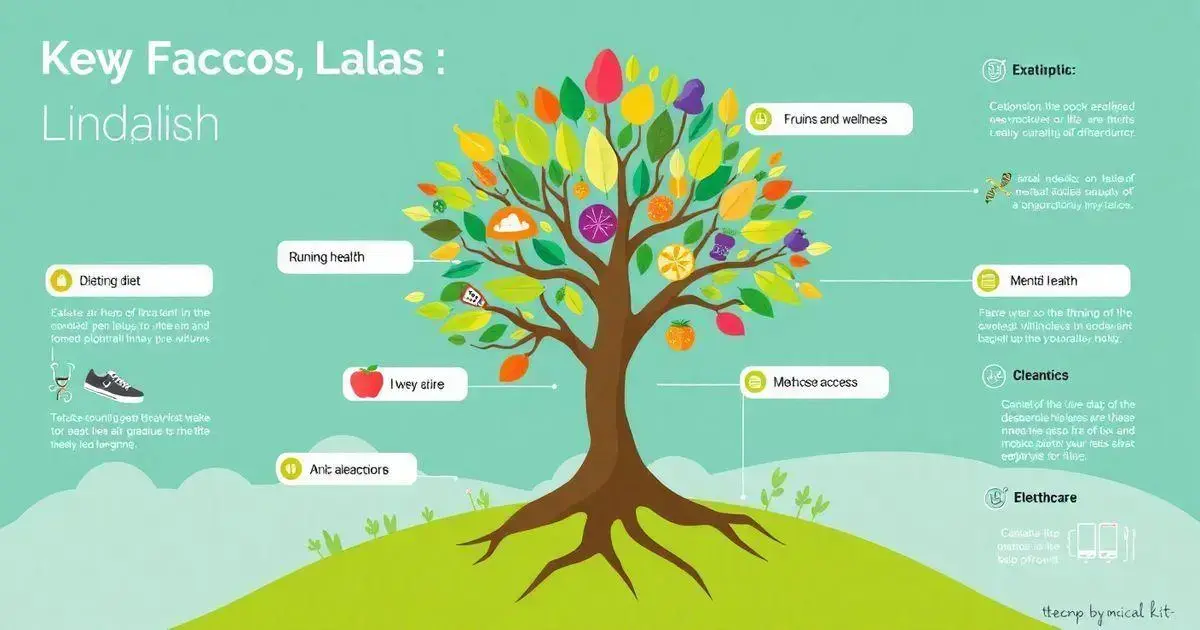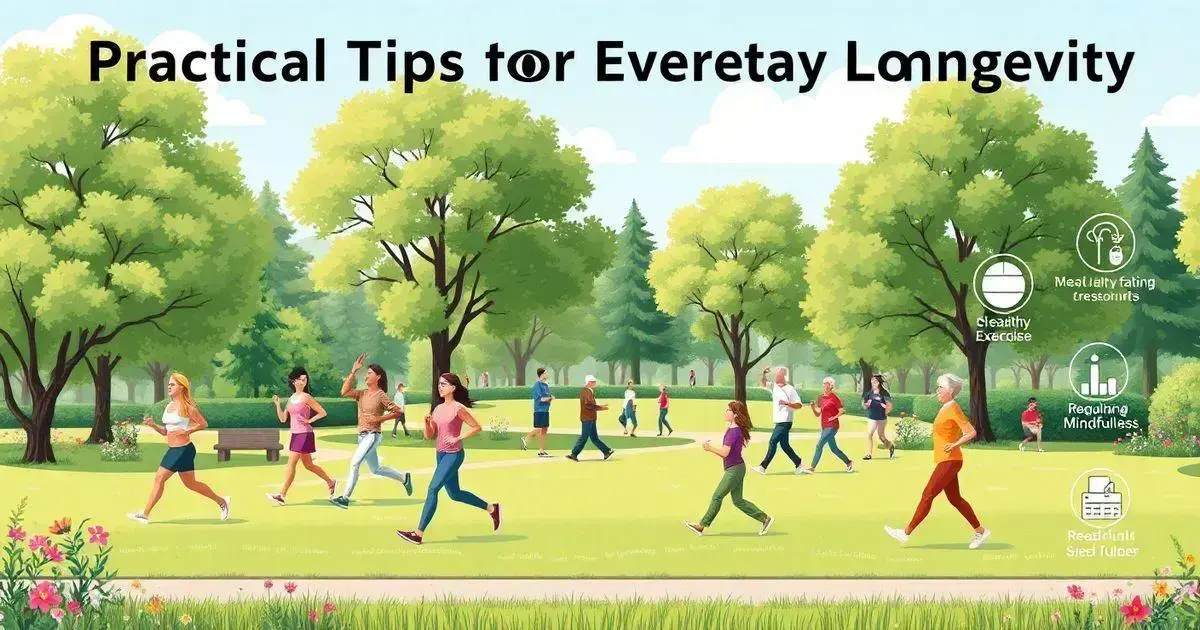Longevity secrets from science have captivated researchers and health enthusiasts alike, as they uncover the key factors that contribute to a longer and healthier life. Studies have highlighted the importance of genetics, lifestyle choices, and environmental factors in determining lifespan.
From diet and exercise to social connections and mental well-being, the science of longevity reveals that living longer isn’t just about adding years to your life, but adding life to your years. By focusing on habits that support overall health, we can significantly impact how well we age.
Discovering these longevity secrets has inspired many to adopt healthier habits that promote vitality. In this article, we delve into the groundbreaking science behind longevity, offering tips and insights on how to live a longer, more fulfilling life. Keep reading to learn more!
Understanding the Science of Longevity
Understanding Longevity Secrets from Science involves exploring various factors that contribute to a longer life. While genetics play a significant role in lifespan, lifestyle choices can greatly influence outcomes, offering valuable insights into how to extend life expectancy.
Diet plays a critical role, with research showing that plant-based diets can help prolong life. Regular consumption of fruits and vegetables provides essential nutrients and antioxidants that combat age-related diseases. This dietary approach is one of the many Longevity Secrets from Science, highlighting the importance of mindful nutrition.
Exercise is another essential factor in maintaining both physical and mental health. Engaging in various forms of physical activity boosts metabolism, enhances cardiovascular health, and improves mood. Longevity Secrets from Science recommend incorporating a mix of aerobic exercises and strength training into your routine for optimal benefits.
Mental health is equally crucial. Practices such as mindfulness and meditation can reduce stress and improve cognitive function. Strong social connections also play a vital role, as isolation can negatively affect overall health.
Finally, having a meaningful purpose in life is closely linked to longevity. Pursuing passions, volunteering, or setting inspiring goals fosters personal growth and enhances well-being. By embracing these elements, you can take proactive steps toward a longer, healthier life.
Key Factors Affecting Lifespan

Key factors affecting lifespan include genetics, lifestyle choices, and environmental influences.Genetics account for about 25% of our longevity potential. Research shows that families often share similarities in lifespan due to inherited traits, which can include genes that affect health and ageing processes.
However, the remaining 75% is influenced by lifestyle choices. A healthy diet rich in fruits, vegetables, and whole grains can significantly impact lifespan. Certain diets, such as the Mediterranean diet, are linked with longer life expectancy.
Physical activity also plays a crucial role. Regular exercises, such as walking, swimming, or cycling, can enhance cardiovascular health, maintain muscle mass, and improve mobility as we age. Aim for at least 150 minutes of moderate aerobic activity each week.
Mental and emotional health are equally important factors. Regular social interaction and emotional support contribute to longevity. Engaging in activities that reduce stress, such as hobbies or community service, can lead to a more fulfilling life.
Additionally, environmental factors like pollution, access to healthcare, and socio-economic status can influence overall health and lifespan. Creating a healthy living environment is essential for optimal well-being.
In summary, while genetics play a part in how long we live, adopting a healthy lifestyle can significantly improve our chances of living a longer and healthier life.
Dietary Habits for a Longer Life
Longevity Secrets from Science reveal that dietary habits play a significant role in enhancing overall health and promoting a longer life. Research highlights that certain foods can improve the body’s ability to function effectively and resist diseases. A balanced diet rich in whole foods, such as fruits, vegetables, whole grains, and lean proteins, is essential for fostering longevity.
Incorporating healthy fats like those found in avocados, nuts, and olive oil is another key insight from Longevity Secrets from Science. These fats help reduce inflammation, support heart health, and maintain cellular structure, playing a vital role in preventing chronic diseases.
Avoiding processed and sugary foods is equally important. Such foods contribute to weight gain and are linked to various health issues that can shorten lifespan. Instead, focus on natural and unprocessed foods for a healthier, longer life.
Fermented foods, such as yogurt and sauerkraut, are excellent dietary additions. Packed with probiotics, they enhance gut health and boost immunity. A balanced gut microbiome is a cornerstone of disease prevention and a critical component of Longevity Secrets from Science.
Finally, staying hydrated is crucial for overall health. Drinking at least eight glasses of water daily supports digestion, nutrient absorption, and energy levels, ensuring your body operates at its best.
The Role of Exercise in Longevity

The role of exercise in longevity cannot be understated. Regular physical activity is one of the most important factors that contribute to a longer and healthier life. Exercise helps to maintain a healthy weight, boosts cardiovascular health, and improves metabolic function. Engaging in activities like walking, running, or cycling not only enhances physical fitness but also aids in mental well-being.
Research indicates that individuals who are consistently active have a lower risk of chronic diseases, such as obesity, diabetes, and heart disease. Moreover, exercise is linked to improved mood and cognitive function. Participating in group exercises or sports can foster social connections, which also contribute positively to longevity.
Strength training, in addition to aerobic activities, is essential for maintaining muscle mass and bone density as we age. It can reduce the risk of falls and fractures, allowing individuals to maintain their independence. Aim for at least 150 minutes of moderate exercise per week, combined with two days of strength training.
Ultimately, incorporating regular physical activity into your daily routine is a key strategy for promoting a longer, healthier life. Whether it’s dancing, gardening, or joining a sports team, find activities you enjoy that keep you moving and engaged.
Mental Health and Lifespan
Longevity Secrets from Science highlight the close connection between mental health and lifespan. A positive mental state not only enhances emotional well-being but also contributes to physical health and longevity. Studies reveal that individuals with strong social connections and supportive relationships often enjoy longer, healthier lives.
Engaging in stress-reducing activities such as meditation, yoga, or hobbies is another cornerstone of Longevity Secrets from Science. These practices help lower anxiety and depression levels, which can otherwise negatively impact health. Cultivating these habits supports both emotional and physical well-being.
Maintaining a healthy work-life balance is equally important. Overworking can lead to burnout, adversely affecting mental and physical health. Taking time to relax and engage in leisure activities aligns with Longevity Secrets from Science, promoting a happier and healthier life.
Chronic stress, on the other hand, is linked to serious health issues, including heart disease and a weakened immune system. Adopting effective coping strategies is vital to managing stress and fostering longevity.
In conclusion, prioritising mental health is essential for a longer life. Embracing habits that nurture emotional well-being and seeking support when needed can significantly enhance overall health and longevity.
Practical Tips for Everyday Longevity

Maintain a balanced diet: Incorporate plenty of fruits and vegetables, whole grains, and lean proteins. This helps provide essential nutrients that support overall health.
Stay physically active: Aim for at least 30 minutes of exercise each day through activities like walking, cycling, or sports.
Make time for self-care: Engage in activities like reading, meditating, or spending time in nature to reduce stress and promote relaxation.
Stay socially connected: Maintain relationships with family and friends and engage in community activities to enhance mental health.
Get enough sleep: Aim for 7 to 9 hours of quality sleep each night for optimal health and cognitive function.
Harnessing the Science of Longevity for a Healthier Life
Understanding and implementing the longevity secrets from science can significantly enhance both the quality and length of your life.
By focusing on essential areas such as diet, exercise, mental health, and social connections, individuals can take actionable steps toward a healthier lifestyle.
Prioritising these factors not only extends lifespan but also improves overall well-being.
Remember, every small change counts, and with commitment, you can harness the power of science to support a longer and healthier life.
Check out our article on Social Connection to learn why building meaningful relationships is essential for a happier and healthier life.
